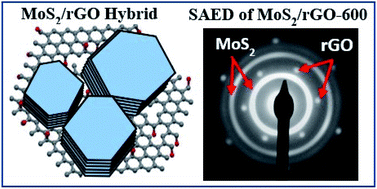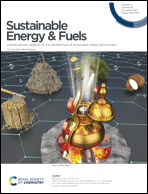Tuning the defects in MoS2/reduced graphene oxide 2D hybrid materials for optimizing battery performance†
Abstract
This study reports the preparation of a set of hybrid materials consisting of molybdenum disulfide (MoS2) nanopatches on reduced graphene oxide (rGO) nanosheets by microwave specific heating of graphene oxide and molecular molybdenum precursors followed by thermal annealing in 3% H2 and 97% Ar. The microwave process converts graphene oxide to ordered rGO nanosheets that are sandwiched between uniform thin layers of amorphous molybdenum trisulfide (MoS3). The subsequent thermal annealing converts the intermediate layers into MoS2 nanopatches with two-dimensional layered structures whose defect density is tunable by controlling the annealing temperature at 250, 325 and 600 °C, respectively. All three MoS2/rGO samples and the MoS3/rGO intermediate after the microwave step show a high Li-ion intercalation capacity in the initial 10 cycles (over 519 mA h gMoSx−1, ∼3.1 Li+ ions per MoS2) which is attributed to the small MoS2 nanopatches in the MoS2/rGO hybrids while the effect of further S-rich defects is insignificant. In contrast, the Zn-ion storage properties strongly depend on the defects in the MoS2 nanopatches. The highly defective MoS2/rGO hybrid prepared by annealing at 250 °C shows the highest initial Zn-ion storage capacity (∼300 mA h gMoSx−1) and close to 100% coulombic efficiency, which is dominated by pseudocapacitive surface reactions at the edges or defects in the MoS2 nanopatches. The fast fading in the initial cycles can be mitigated by applying higher charge/discharge currents or extended cycles. This study validates that defect engineering is critical for improving Zn-ion storage.

- This article is part of the themed collection: Sustainable Energy & Fuels Recent HOT Articles


 Please wait while we load your content...
Please wait while we load your content...
